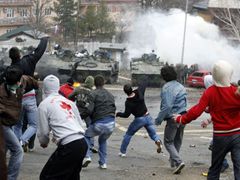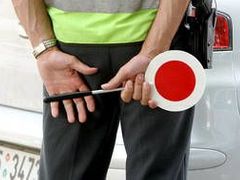After months of hearing only talk about the US radar, the first treaty concerning the planned base in Brdy was approved last week by the Czech Cabinet. All ministers voted in favor, with the outspoken opponent Ondřej Liška apparently abstaining from the vote. Although the Education Minister himself did not confirm how he voted, it is clear that his party is split on the issue. Two Green MPs, Olga Zubová and Věra Jakubková, are thinking of voting the proposal down once it goes to parliament for approval. Some Christian Democrats (KDU-ČSL) are also undecided.
Liška's main concern is the fact that the Brdy base will not be under direct NATO control. The newly approved treaty stipulates, that the US forces will be holding the reigns. Although unfazed by the issue of administration, the Cabinet has still decided to wait for the approval of the bilateral SOFA-NATO agreement to submit both of them to parliament for ratification, potentially to increase their chances.
**
The Cabinet has made another difficult decision this past week, officially recognizing Kosovo's independence . This vote was much farther from having unanimous support. Although the ministers have certainly taken their time to reach an official decision, for many it was still too soon. Christian Democratic Party members did not vote for the recognition, but hinted that they may do it eventual, when the time is right. While the opposition Social Democratic chairman Jiří Paroubek outright called it a "reckless decision" that has no support.
Reckless or not, the government's decision, with its main proponent Foreign Affairs Minister Karel Schwarzenberg, received a quick response. Not a day later, Serbia recalled its ambassador to the Czech Republic, Vladimir Vereš, back to Belgrade. Although the Foreign Affairs Ministry has hoped that the move to recognize Kosovo would bring stability to the Balkans region, it has created tension elsewhere. Although, it also seems expected, given that Serbia has done the exact same thing to all countries that have so far recognized Kosovo as an independent state.
**
The Czech Republic may be facing its own border problems soon. Poland wants 369 hectares it lost to its southern neighbor fifty years ago. In order to solve an ongoing dispute over the Těšin territory in Silesia, Poland and Czechoslovakia signed an agreement about moving their borders to the south, in 1958. Realizing only later that the net loss is on their side, Warsaw has recently asked to be reimbursed.
Last week, the Liberec region has already expressed its strong disapproval over potentially losing land . So far, Commissioner Skokan's unwillingness to hand over a few kilometers of forest land does not carry any nationalistic overtones. But as more details about the list of localities to be given over start to appear this and in the upcoming weeks, it is unclear how the borderland regions are going to react.
**
Brno has expressed its desire to build. And build big. At a roundtable discussion last week, Brno's Mayor Roman Onderka encouraged investors to build highrises in many parts of the city. Besides attracting famous architects, who may be too radical for Prague, Czech Republic's second largest city wants to be build a skyscraper that would outdo Prague's planned 109-meter-high City Tower. These are big dreams, but Brno certainly does seem to be lacking in potential or innovative spirit.
**
The capital city is also not lagging behind with new developer project. Prague 8 officials announced last week that the task of developing the Rohanský ostrov neighborhood in Karlín will go to Konsorcium Rohan, who made a CZK 1.69 billion offer the city couldn't refuse. A former island, Rohanský ostrov will be developed as a modern residential and entertainment center.
Another project in the city has partially fallen through, literally. A crater 20 meters in diameter developed in Stromovka last Tuesday in a place where earth fell in on the constructed tunnel below the park . Construction workers blamed rain for the collapse, but long-time critics of the park saw their worse fears come true. The rock formation in the former royal deer park is weak, and there is little assurance that more damages will not be caused.
**
The education reforms planned by PM Mirek Topolánek and Education Minister Ondřej Liška, known as "The White Book", have been put at risk by the budget for 2009-2011 proposed by the cabinet. Allocations for post-secondary education are just too low, and the yearly increase for that period will not even be enough to cover inflation, or expenses such as building maintenance or increase in real salaries. Even this year, universities may be facing losses. In terms of money allocated per student, universities receive one ninth of what they did last year. Many may see this as impetus for change in higher education, while others, such as the Education Minister and the rectors of the country's universities, see a realistic decline in revenues.
**
You may not think so after getting through the morning rush hour, but the Prague city council is convinced that the city's drivers are better behaved these days. Spokesperson Jiří Wolf announced last week that cases of speeding, and the number of accidents caused by speeding has decreased by tens of percentage points compared to the last two years. The police are convinced that the presence of speed measuring devices on many roads, and the identification of their locations on the intern has helped reduce the number of violators…or the number of those who get caught.


